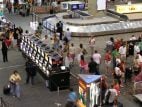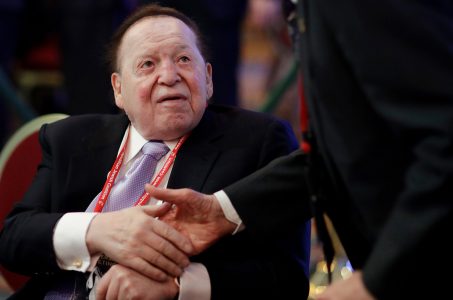Chicago Airport Slots Would Generate More Revenue Than Existing Machines at Las Vegas McCarran Airport, Study Says
Posted on: August 21, 2019, 08:59h.
Last updated on: August 21, 2019, 10:10h.
The suggested 500 slot machines placed at O’Hare and Chicago Midway international airports could land close to $37 million a year for the Windy City. That would even surpass the revenue from slots at Las Vegas’ McCarran International Airport — where there are about 1,300 slots, the Chicago Sun-Times reported based on a Union Gaming Analytics study.

The research projected that each proposed slot in Chicago’s two airports could raise $200 a day. Annual gross revenue would total some $36.5 million.
The study also predicts Chicago airport slots “should hold greater appeal” among passengers who pass their time at the Chicago airports by gambling than those found at Las Vegas or Reno airports. They are after all “a captive audience,” the study says.
Ultimately, slot machines at Chicago airports should perform notably better than those in Nevada’s airports,” the Union Gaming study concludes.
Close to 40 million commercial travelers passed through O’Hare in 2018. Some 10.7 million passengers used Midway for flights last year.
There were about 23.7 million travelers at McCarran and some 2 million at Reno-Tahoe International Airport in 2018, according to Federal Aviation Administration data. Reno-Tahoe features 240 slot machines.
As envisioned, slots at the Chicago airports would be run by the operator of a proposed Chicago casino. That future of that urban property remains in doubt given its likely tax burden.
Slots at Chicago Airports Make Economic Sense
Experts are confident in the wisdom of placing slots at Chicago airports. When reached for comment, Frank Manzo IV, policy director at the Illinois Economic Policy Institute, told Casino.org that “slot machines at Chicago airports would be feasible with or without the proposed casino in Chicago.”
Michael Wenz, an economics professor at Northeastern Illinois University, added that Chicago “airport slot machines seem like a very well-targeted way to raise gambling tax revenue.
“Lots of the wagers will come from non-residents, and relative to a casino or the small slot machine parlors, it isn’t likely that the airport will increase the incidence of problem gaming,” Wenz told Casino.org. “There is a possibility that this will cannibalize some of the other revenues from the airport, but the net effect on tax revenues should be very positive in any case.”
Also, Cory Aronovitz, an attorney at the Casino Law Group, told Casino.org that the Union Gaming report “supports … that the Chicago transit hubs see a critical mass of travelers compared to other markets, including Las Vegas — and as a result a conservative estimate indicates significant revenue opportunity.
“I do not think it impacts the tremendous development opportunity of a Chicago casino and I am confident that lawmakers will continue to work to ensure that Chicago is a win for the state, the city, developers’ ancillary business and workers,” Aronovitz added.
Frank Manzo additionally predicts that the tax structure for the proposed Chicago casino “can be worked out so it becomes profitable.”
The wider Union Gaming feasibility study focuses mainly on the economics of placing a mega-casino in one of five possible locations in Chicago. The consultant concluded the casino proposal would be “not feasible” because of the tax burden under a new law — but it may be altered by the Illinois legislature in potential legislation.
Criticism of Chicago Feasibility Study
When it comes to the Chicago casino feasibility study, Michael Wenz said it seems “a very poor substitute for an open request for proposals.
“Developers and financiers can decide whether they can make a profitable run at a casino, and they would have skin in the game, unlike an independent consultant,” Wenz told Casino.org. “The feasibility study should have been focused on feasibility from the standpoint of the city and the state, not the standpoint of the private developer.
“Instead all the city and state did was hand the casino industry a stronger position to renegotiate the casino bill, when it’s not clear they needed to. It seems like they are negotiating against themselves.”
Related News Articles
Most Popular
Las Vegas Overstated F1 Race’s Vegas Impact — Report
Vegas Strip Clubs Wrestle in Court Over Animal Names
Most Commented
-
End of the Line for Las Vegas Monorail
— April 5, 2024 — 90 Comments -
Mega Millions Reportedly Mulling Substantial Ticket Price Increase
— April 16, 2024 — 6 Comments -
Nearly Abandoned Mall Outside Vegas Soon to Have Only One Tenant
— March 12, 2024 — 5 Comments -
Long Island Casino Opponents Love New York Licensing Delays
— March 27, 2024 — 5 Comments
















No comments yet